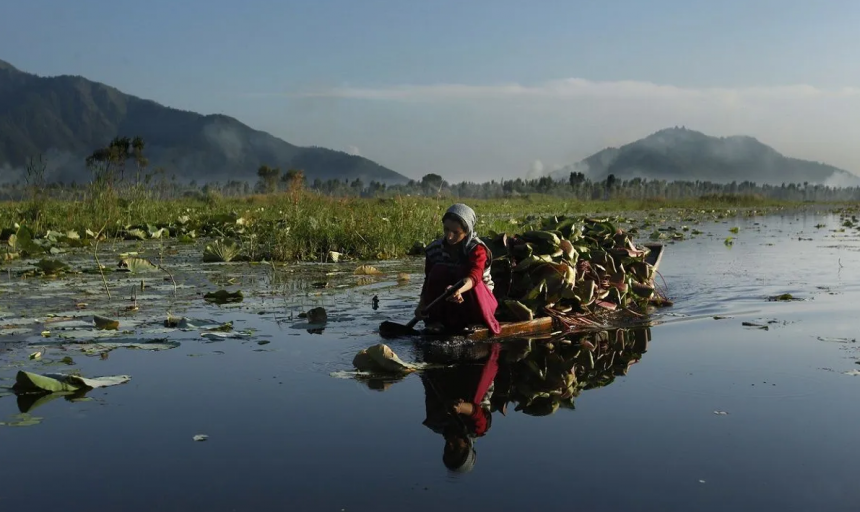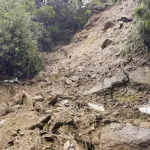Kashmir’s wetlands, with their intricate ecosystems and captivating beauty, are essential to the region’s biodiversity, supporting countless species and serving as a haven for migratory birds. Known for their ecological importance, these wetlands play a critical role in regulating the climate, filtering pollutants, and mitigating floods. However, they are rapidly deteriorating due to unchecked urbanization, pollution, encroachment, and inadequate conservation efforts. This decline has serious consequences, both for the environment and for the rich biodiversity that relies on these habitats.
Overview of Kashmir’s Wetlands
Kashmir’s wetlands, including Hokersar, Wular, and Dal Lake, are some of the region’s most vital ecosystems. These wetlands are not only important for local flora and fauna but also serve as critical stopover points for migratory birds from Siberia, Central Asia, and other parts of the world. The varied vegetation, from reeds to floating vegetation, provides both shelter and food, creating a thriving habitat for migratory birds as well as numerous fish, insects, and other wildlife. The scenic beauty of these wetlands also draws tourists and supports local livelihoods.
Despite their importance, Kashmir’s wetlands face escalating threats. Pollution from industrial and domestic sources, unplanned urban growth, climate change, and lax regulations have contributed to the degradation of these areas. The result is a complex environmental crisis that affects water quality, reduces biodiversity, and disrupts the lives of species that depend on these ecosystems. To better understand the impacts, it is essential to examine the specific environmental challenges and the effect on migratory bird populations.
(A) Environmental Impact of Degrading Wetlands:
Water Quality Decline
Water quality in Kashmir’s wetlands has declined alarmingly, primarily due to pollution from untreated sewage, agricultural runoff, and industrial waste. As towns and cities expand, increasing amounts of untreated sewage and solid waste flow into the wetlands. Fertilizers and pesticides from nearby agricultural lands also find their way into these water bodies, increasing the levels of nitrogen and phosphorus. This leads to eutrophication—a condition in which high nutrient levels cause an overgrowth of algae. When algae die and decompose, oxygen levels in the water deplete, harming fish and other aquatic species that depend on oxygen-rich waters.
Furthermore, untreated sewage introduces pathogens and harmful chemicals, endangering not only aquatic life but also human populations who may rely on the water for domestic or agricultural use. Poor water quality disrupts the balance of the wetland ecosystem, making it less hospitable for diverse species and lowering its resilience to other environmental stresses.
Reduction in Natural Filtration
Wetlands are natural filters, trapping pollutants and sediments that would otherwise flow into rivers, lakes, and groundwater systems. The physical structures of wetlands, including plants and soil, filter out toxins, metals, and suspended particles, thereby maintaining water quality. However, as these wetlands degrade, their filtration capacity weakens. Reduced wetland area and deteriorating plant life mean fewer pollutants are filtered out, resulting in poorer water quality downstream. This also impacts the quality of water in rivers like the Jhelum, which relies on wetland inflows and is a primary water source for many communities.
The weakening of the wetlands’ natural filtration also affects biodiversity. Species sensitive to pollutants, such as fish and amphibians, find it harder to survive, disrupting food chains and ecosystems dependent on them. This ecological imbalance ultimately affects the humans and animals that rely on healthy wetlands for resources.
Climate Regulation Loss
Wetlands act as carbon sinks, absorbing carbon dioxide and reducing its presence in the atmosphere. As they degrade and shrink, their carbon absorption capacity decreases, which exacerbates climate change. The carbon stored in wetland soil and plants is released back into the atmosphere when the wetlands dry out or are damaged, contributing to increased greenhouse gases and global warming.
In Kashmir, where glaciers and snowmelt affect water availability, climate regulation by wetlands is crucial. The loss of wetland areas further intensifies local climate fluctuations, which can impact agriculture, water supplies, and biodiversity. Protecting these wetlands could help mitigate climate change impacts locally and contribute to the global effort to reduce greenhouse gas emissions.
Increased Flood Risk
One of the critical functions of wetlands is to store excess rainwater, reducing flood risks. They act as sponges, soaking up and gradually releasing water, thereby regulating water flow. However, as wetlands in Kashmir shrink, their ability to hold water diminishes, increasing the region’s vulnerability to floods. During heavy rains or snowmelt, wetlands that would once have absorbed and moderated water flow are now less capable of handling excess water, leading to flash floods in surrounding areas.
This situation has severe implications for the people living near these wetlands. Floods damage property, displace families, and disrupt agriculture, creating both immediate and long-term hardships. Without the buffering effect of healthy wetlands, Kashmir is likely to experience more frequent and intense flooding events, underscoring the need for wetland restoration to help manage water levels.
(B) Loss of Habitat for Migratory Birds:
Decline in Bird Populations
Kashmir’s wetlands are a vital stopover for migratory birds traveling between distant regions such as Siberia and Central Asia. These birds, including species like the Common Teal, Northern Pintail, and Mallard, depend on Kashmir’s wetlands for resting, nesting, and feeding. However, with the declining size and quality of wetlands, there are fewer suitable nesting and feeding sites for these migratory birds. This has led to a decrease in bird populations and disrupted migratory patterns.
Birds rely on wetlands to refuel and recuperate during their long migratory journeys. Reduced wetland areas mean less food and shelter, causing some birds to skip the region entirely or find alternative routes. This disruption in migration not only affects the birds but also has a cascading effect on biodiversity in the region. Birds play a crucial role in dispersing seeds, controlling insect populations, and maintaining ecological balance. A decline in migratory birds could weaken these ecosystem services.
Disturbance from Human Activities
Human activities, including construction, tourism, and fishing, disturb the quiet natural environment that birds need for breeding and resting. Noise pollution from nearby roads, hotels, and recreational activities scares away sensitive bird species. In particular, large construction projects near wetland areas fragment habitats and create barriers for birds. For migratory species, which are highly sensitive to disturbances, these interruptions can affect their breeding success and survival.
The rise in unregulated tourism in Kashmir also adds pressure on wetlands. Tourists often leave litter, and their presence disturbs birds. The lack of designated zones or limits for visitors near wetlands has further compromised these areas as safe habitats for migratory birds, intensifying the need for stricter controls and regulations around wetland tourism.
Decreased Food Availability
Pollution and encroachment have led to a reduction in the vegetation and aquatic life within Kashmir’s wetlands, leading to a decrease in available food for migratory birds. Fish, insects, and aquatic plants are essential components of the diet of many bird species. With declining food availability, migratory birds struggle to find sustenance, forcing them to move on prematurely or avoid these wetlands altogether.
This decrease in food availability, coupled with habitat degradation, makes it difficult for many bird species to complete their migratory journeys successfully. Without adequate resources, migratory birds may fail to breed or suffer from poor health, further endangering their populations. The disruption of these food webs highlights the interconnectedness of wetland ecosystems and the need for comprehensive conservation.
(C) Urgent Need for Conservation Efforts:
Strengthening Regulations
Stronger legal protections and enforcement are vital to preserving Kashmir’s wetlands. Regulations must address issues such as encroachment, pollution, and unregulated tourism. Stringent enforcement of existing laws, coupled with new policies that recognize the ecological value of wetlands, is essential. Additionally, creating buffer zones around wetlands can prevent encroachment and limit human activity that threatens wetland ecosystems.
Implementing regulations is also a matter of accountability. By enforcing restrictions and ensuring sustainable land-use practices, local authorities can protect wetland habitats and allow biodiversity to recover. Strict regulations, if effectively enforced, can enable wetland ecosystems to function naturally and support both migratory birds and local wildlife.
Restoration and Rehabilitation
Restoration initiatives are crucial for reviving degraded wetlands. This involves removing invasive species, planting native vegetation, and cleaning water bodies to improve water quality. Rehabilitation efforts can restore the ecological functions of these wetlands, allowing them to act as carbon sinks, flood regulators, and biodiverse habitats.
Programs such as reforestation around wetlands or the removal of pollutants can go a long way in improving habitat quality. Successful restoration projects not only benefit wildlife but also contribute to the region’s climate resilience and water management.
Awareness and Community Involvement
Raising awareness about the importance of wetlands and involving local communities in conservation efforts are critical steps. Educating the public on how wetlands benefit the environment and economy can foster community-led conservation actions. When local communities understand the stakes, they are more likely to support sustainable practices, reduce harmful activities, and assist in wetland protection.
Involving local communities in conservation also leads to long-term success. Empowered communities can monitor wetlands, report violations, and participate in restoration projects, creating a more sustainable approach to wetland management.
Conclusion
The worsening conditions of Kashmir’s wetlands are a pressing concern with far-reaching implications for the environment, biodiversity, and people of the region. The degradation of water quality, loss of natural filtration, weakened climate regulation, and increased flood risk collectively pose a severe threat to Kashmir’s ecological balance. Additionally, the decline in habitat for migratory birds has disrupted regional biodiversity and affected migratory patterns on a global scale.
To address these issues, urgent conservation measures are essential. Strengthening regulations, restoring degraded areas, and involving local communities can collectively help preserve these critical ecosystems. By prioritizing wetland conservation, Kashmir can protect its biodiversity, mitigate the impacts of climate change, and ensure a sustainable future for both humans and wildlife.
Preserving Kashmir’s wetlands is not only a matter of environmental concern but also a testament to the region’s rich natural heritage. These wetlands are vital for maintaining the ecological balance and providing habitat to migratory birds that enrich Kashmir’s biodiversity. By recognizing the importance of wetlands and implementing strong conservation practices, local authorities and communities can work together to prevent further degradation.
In conclusion, addressing the worsening conditions in Kashmir’s wetlands requires a multi-faceted approach. This includes enforcing environmental regulations, investing in restoration and rehabilitation projects, and fostering awareness among communities. Protecting these wetlands will support Kashmir’s broader environmental health, reduce flood risks, and sustain migratory bird populations. Immediate and sustained action is crucial to safeguard these natural resources for future generations, ensuring that Kashmir’s unique ecosystems and the migratory birds they support continue to thrive.
(The author is a Social Activist and National TV debater. The ideas expressed are his own and can be reached on @[email protected])








